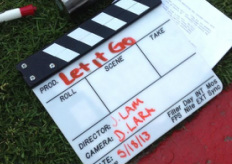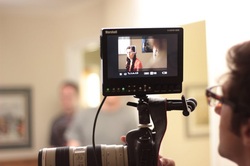
Directing is one of those unique skill sets that require a tremendous deal of finesse to pull off effectively. It's akin to taking a human being and guiding him/her to becoming an entirely different person. It's like Michelangelo looking at what most people would perceive as a giant slab of marble, but instead, envisioning the shape of David. A master sculptor such as Michelangelo possesses a high level of artistic control to shape a near perfect anatomical resemblance of the human body. However, a Film Director who controls and dictates too heavily the beats of emotions for his/her actors may have the opposite effect, as actors are not made of marble. They are living, breathing human beings.

Change My Vision into Our Vision
One of the best ways I've discovered to work with actors is to become as collaborative as possible by inviting actors to contribute and share their vision for the story. It may feel scary to let go of your control by allowing others to shape your story's vision, but what can occur in this process is that you will bring out the best performances in your actors. Actors revel in the ability to play with their emotions, which is best utilized if they feel empowered to make choices of their own free will.
Learn to Let Go
Emotions are a tricky nuance of human behavior to convey, even within ourselves in real life as our emotions can guide us towards irrational behaviors and desires. And when we direct actors by imposing behaviors that we are comfortable with and are based on our life experience, we are forcing a box for the actors to perform within. This has a tendency to stifle their emotions by treating the actors like robots rather than human beings, whose myriad of emotional ups and downs can never be defined or confined within a box. By telling someone to act/react in a specific way at a specific moment, we are effectively robbing them of their choice to bring forth what they feel is an appropriate emotion within that moment. Allowing actors to express their own emotions, in their own unique way, will ring much closer to truth for audiences.
One of the best ways I've discovered to work with actors is to become as collaborative as possible by inviting actors to contribute and share their vision for the story. It may feel scary to let go of your control by allowing others to shape your story's vision, but what can occur in this process is that you will bring out the best performances in your actors. Actors revel in the ability to play with their emotions, which is best utilized if they feel empowered to make choices of their own free will.
Learn to Let Go
Emotions are a tricky nuance of human behavior to convey, even within ourselves in real life as our emotions can guide us towards irrational behaviors and desires. And when we direct actors by imposing behaviors that we are comfortable with and are based on our life experience, we are forcing a box for the actors to perform within. This has a tendency to stifle their emotions by treating the actors like robots rather than human beings, whose myriad of emotional ups and downs can never be defined or confined within a box. By telling someone to act/react in a specific way at a specific moment, we are effectively robbing them of their choice to bring forth what they feel is an appropriate emotion within that moment. Allowing actors to express their own emotions, in their own unique way, will ring much closer to truth for audiences.
Directing without Directing
Here are some things you can say to your actors to bring out their performances and allow them to fully collaborate in a shared vision of the film: Tell your actors that acting is their job, not yours. Tell them that they are free to direct themselves in any way they choose and there are no wrong choices. Impart to them that they need to take ownership of the scene, ownership of the project, and ownership of how their overall performance will affect audiences for years to come. Tell them that they are to listen to each other, and not you, to shape their actions and reactions. Invite them to move freely within the scene from beginning to end of each rehearsal. Allow them to explore, play, and lose themselves with each rehearsal and allow them to rehearse as many times as possible, until they feel comfortable in conveying the truth of their characters. And let them know that if they need help from time to time, to please ask you and you will do your best with your guidance. Tell them that the work that they do is something they should be proud of for the rest of their lives.
Here are some things you can say to your actors to bring out their performances and allow them to fully collaborate in a shared vision of the film: Tell your actors that acting is their job, not yours. Tell them that they are free to direct themselves in any way they choose and there are no wrong choices. Impart to them that they need to take ownership of the scene, ownership of the project, and ownership of how their overall performance will affect audiences for years to come. Tell them that they are to listen to each other, and not you, to shape their actions and reactions. Invite them to move freely within the scene from beginning to end of each rehearsal. Allow them to explore, play, and lose themselves with each rehearsal and allow them to rehearse as many times as possible, until they feel comfortable in conveying the truth of their characters. And let them know that if they need help from time to time, to please ask you and you will do your best with your guidance. Tell them that the work that they do is something they should be proud of for the rest of their lives.

Camera Placement After Rehearsals
And what to do with the cameras? Once you know where the actors comfortably and naturally move within the scene, and then build your shots based off of their movements. By directing this way it will allow the actors to perform at their best and place the truth of the performance as the highest priority. This way, actors will be free to express themselves as if they were actually living and breathing in the moment of their characters. They will go where they want as their own emotions bubble forth and dictate their behaviors to what they feel is appropriate to the moment. With this approach you will discover some wonderful and magical moments that will occur from the collaboration of many minds as opposed to just one mind. Giving your actors the space to play and perform and then built the shots around them.
In Conclusion
Personally, this has been the best way I've discovered to direct actors and bring about natural performances. Remember that the key is to empower your actors so that they take ownership of their job as an actor. In doing so, you will have released their fears of getting it perfect as they will begin to focus on doing the best job for the Film, rather than for you. Much of this letting go of control will appear strange to many Directors, but before judging this technique, I invite you to try it for one of your films and see what happens. Feel free to comment and share if you were courageous enough to let go and empower your actors.
And what to do with the cameras? Once you know where the actors comfortably and naturally move within the scene, and then build your shots based off of their movements. By directing this way it will allow the actors to perform at their best and place the truth of the performance as the highest priority. This way, actors will be free to express themselves as if they were actually living and breathing in the moment of their characters. They will go where they want as their own emotions bubble forth and dictate their behaviors to what they feel is appropriate to the moment. With this approach you will discover some wonderful and magical moments that will occur from the collaboration of many minds as opposed to just one mind. Giving your actors the space to play and perform and then built the shots around them.
In Conclusion
Personally, this has been the best way I've discovered to direct actors and bring about natural performances. Remember that the key is to empower your actors so that they take ownership of their job as an actor. In doing so, you will have released their fears of getting it perfect as they will begin to focus on doing the best job for the Film, rather than for you. Much of this letting go of control will appear strange to many Directors, but before judging this technique, I invite you to try it for one of your films and see what happens. Feel free to comment and share if you were courageous enough to let go and empower your actors.
 RSS Feed
RSS Feed
